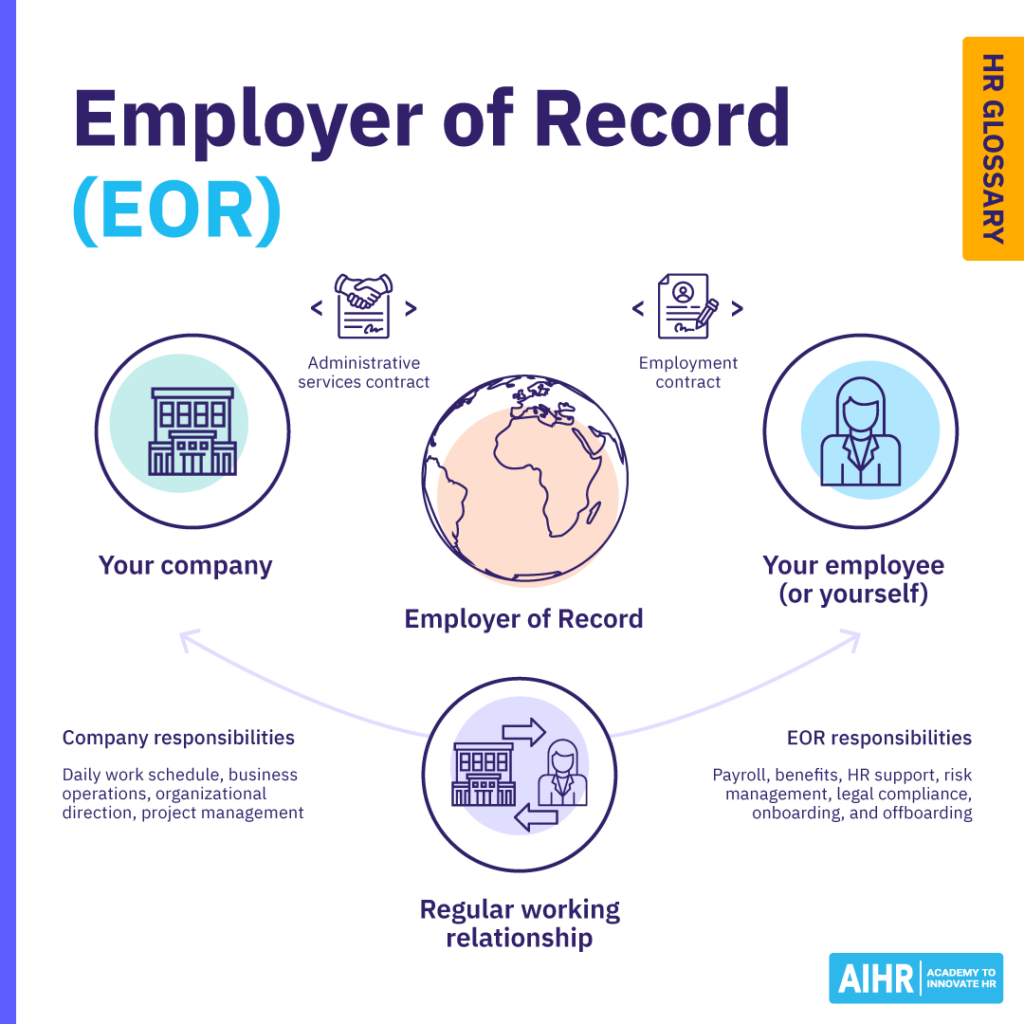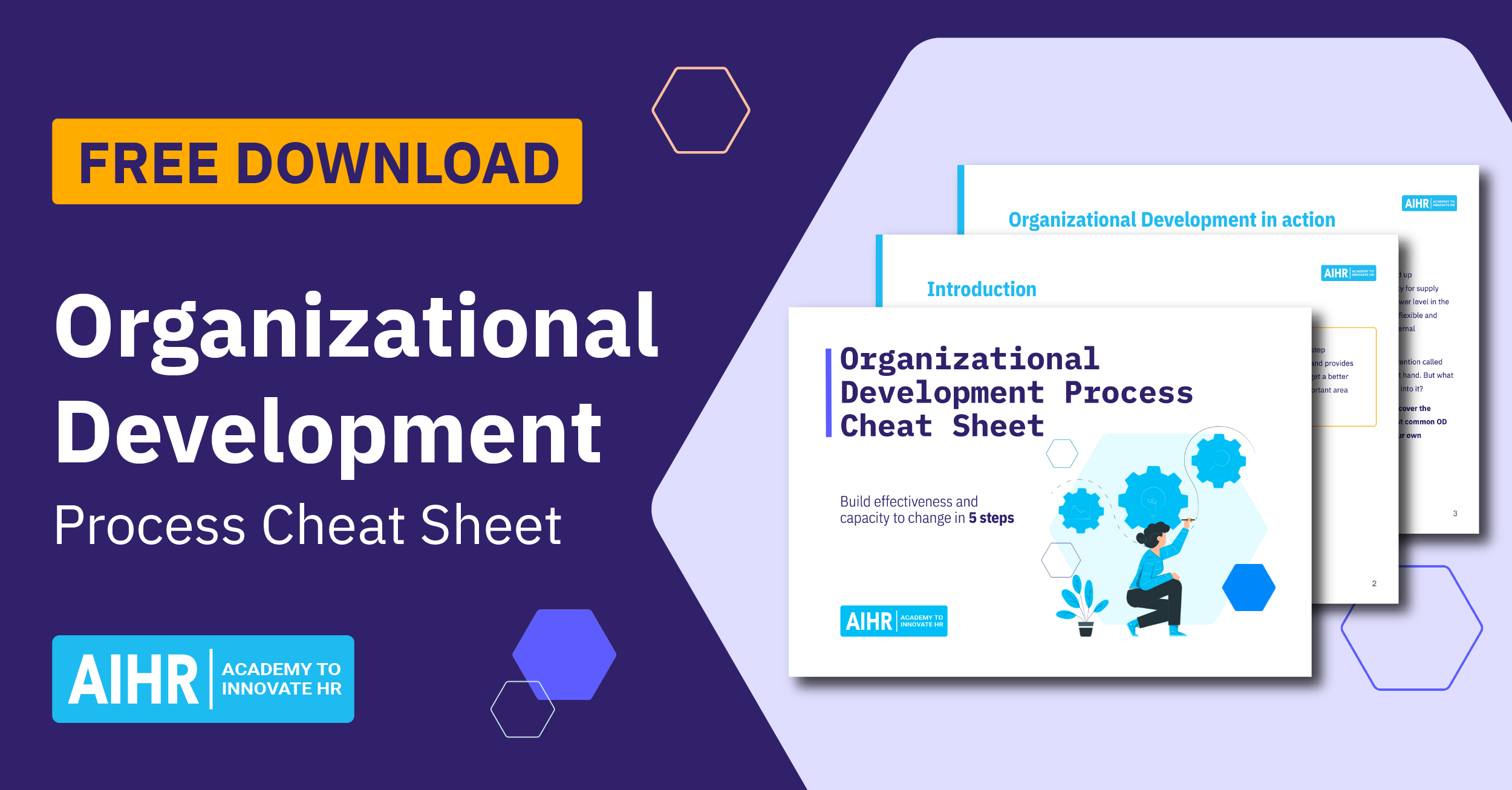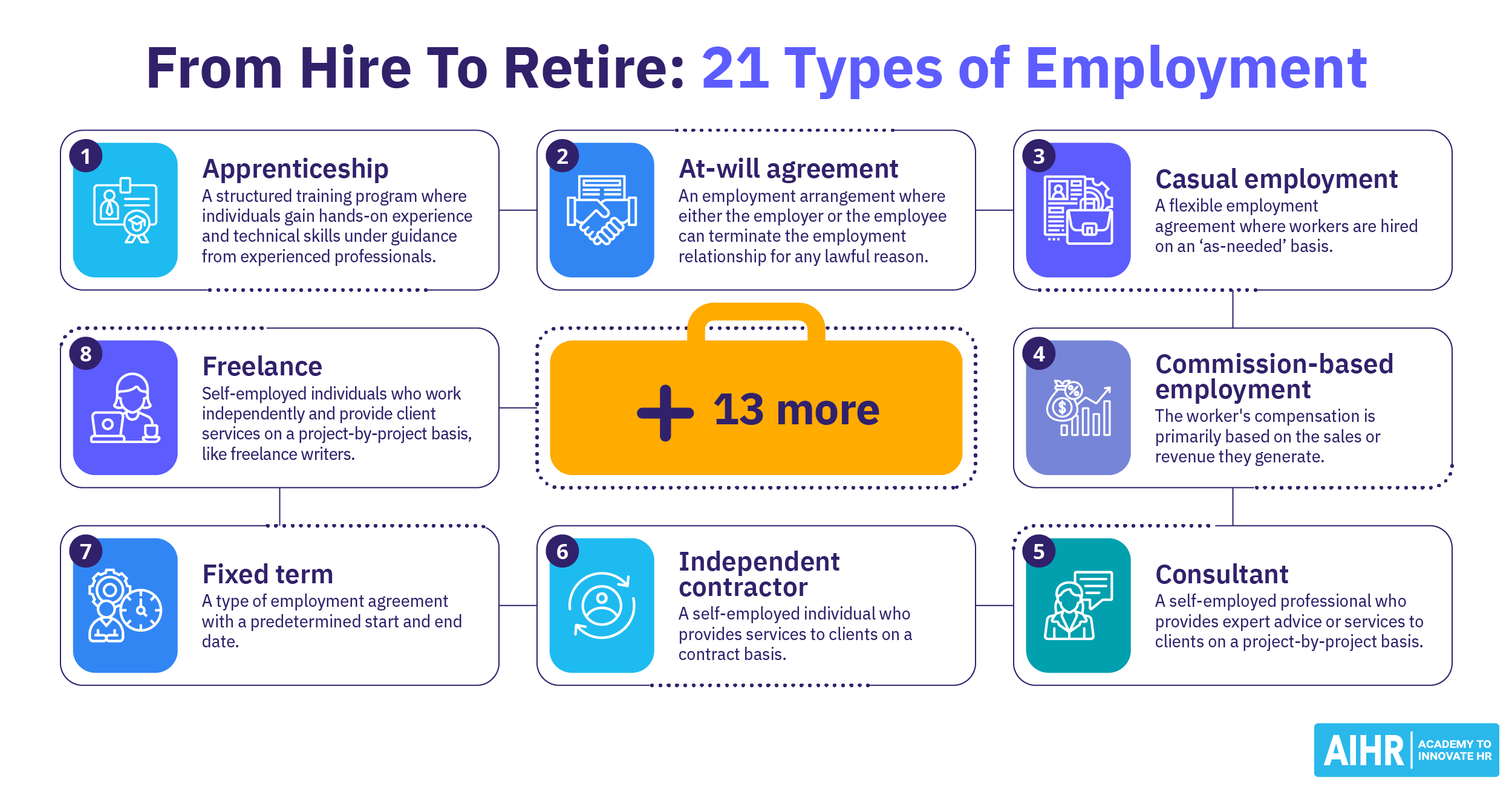Employer of Record
What is an employer of record?
An employer of record (EOR) is an independent third-party organization that assumes the legal and administrative responsibilities of an employer on behalf of another entity known as the ‘client company.’
The EOR handles tasks such as payroll processing, tax withholdings, benefits administration, guidance on local HR regulations, and compliance with applicable labor laws. The primary benefit of using an EOR for client companies is the ability to hire and manage employees in different countries without establishing a legal entity in those locations.
What does an EOR do?
EORs typically provide a comprehensive suite of legally compliant services to enable foreign client companies to acquire workers in different locations without the cost and administrative complexities of setting up a legal entity in each country in which they operate.
These services usually include:
- Payroll management: An EOR processes employee salaries, handles tax withholdings, and manages deductions for benefits, pensions, and other contributions.
- Employee benefits administration: Access to benefits such as health insurance, retirement plans, and other perks.
- Human resources (HR) support: EORs can assist with tasks like onboarding and employee relations, as well as ensure compliance with employment contracts. They can also act as intermediaries between client companies and their employees to help resolve disputes.
- Insurance and risk management: Access to various types of insurance, such as workers’ compensation and professional liability insurance, to protect client companies and their employees.
- Legal and compliance: Ensuring compliance with all relevant employment laws and regulations in countries where EORs operate, including managing work permits, visas, and other necessary documentation.
- Termination of employment: EORs also handle the legal and administrative aspects of terminating employee contracts (including severance pay) in accordance with local labor laws.

Employer of record example
Here is a fictional example that shows how outsourcing responsibilities to a remote EOR can help international companies significantly reduce their administrative burden:
A U.S.-based software company, TechBridge, wants to expand its engineering team by hiring developers in Ireland. However, setting up a subsidiary in Ireland would be time-consuming, expensive, and administratively complex. To avoid this, it partners with a global EOR with an established presence in Ireland, which becomes the new Irish employees’ official employer.
The EOR handles all the related administrative duties, such as ensuring legal compliance, handling employment contracts, and assisting with work permits (where needed). It also processes payroll and taxes and manages employee benefits.
Meanwhile, TechBridge retains oversight over the developers’ day-to-day work, enabling the business to manage projects, provide direction, and monitor the workers’ performance.
Engaging a remote EOR allows it to expand its team in Ireland without the complexities of establishing a local entity. This also enables the company to focus better on its core business while the EOR ensures compliance with Ireland’s employment laws.
Select the right EOR to boost business outcomes
Learn how to choose the correct EOR to help your company achieve its goals. To do so, you must evaluate and compare EORs to ensure they meet legal requirements, offer reliable services, and match specific organizational needs.
AIHR’s Organizational Development Certificate Program will teach you practical strategies to assess organizational needs, evaluate service providers on legal and operational criteria, and make informed decisions to drive positive business outcomes.
Advantages and disadvantages of using an EOR
Carefully consider the following advantages and disadvantages to help you decide whether using an EOR is the best solution for your company’s global employment needs:
Advantages
- Global reach: EORs enable companies to expand into new markets quickly and easily without having to establish a legal entity in each location. This significantly reduces the time and costs associated with international expansion.
- Compliance: EORs are typically experts in local labor laws, tax regulations, and employment standards, ensuring legal compliance and minimizing the risk of legal penalties and disputes.
- Reduced administrative burden: EORs handle all administrative tasks associated with employment, including payroll processing, tax withholdings, benefits administration, and employee onboarding.
- Cost-effectiveness: While EOR services charge ongoing fees, they are often significantly more cost-effective than setting up a subsidiary in a foreign country.
- Access to talent pools: Good EORs help companies access talent pools in different locations, which benefits companies seeking to hire for specialized skills or fill critical roles in challenging markets.
- Scalability and flexibility: EORs enable companies to quickly increase or decrease their workforce in different locations without making major changes to their internal structure.
Disadvantages
- Control limitations: While the client company maintains control over employees’ day-to-day work, some employment decisions may be subject to the EOR’s policies and procedures, which can limit flexibility in workforce management.
- Higher ongoing costs: The fees associated with EOR services can add up over time. These fees typically include a percentage of each employee’s salary, as well as additional fees for services like payroll processing and benefits administration.
- Data security and privacy concerns: It’s important to choose an EOR with robust data security measures to ensure employee data is handled securely and confidentially.
- Dependence on the EOR: Engaging an EOR can create a degree of reliance on it. If the relationship between the company and EOR deteriorates or the EOR faces operational challenges, it can disrupt business operations.
Employer of record vs. professional employer organization
An employer of record (EOR) acts as the legal employer of staff for its client companies. On the other hand, a professional employer organization (PEO) offers HR and benefits to its client companies, but the clients remain the legal employers of their staff.
Legal employer
The EOR is the workers’ legal employer.
The client company remains the workers’ legal employer.
Scope of services
Includes payroll, compliance, tax, contracts, and employee relations.The EOR typically has full control over employment decisions.
Provides HR and benefits support to the client company.
Control over employees
The EOR typically has full control over employment decisions.
The client company retains significant control over employment decisions.
Liability
The EOR assumes full liability for employment-related issues unless an indemnity stating otherwise is signed.
The client company and PEO both share liability.
Cost
Typically higher fees, as the EOR assumes full employment responsibilities.
Generally lower fees compared to an EOR.
Suitability
Best suited for companies expanding into new markets or hiring independent contractors.
Best suited for companies seeking to outsource HR functions and improve their benefits offerings.
How can HR choose the right employer of record?
Consider the following factors when choosing an EOR for your company. This will help ensure your organization’s requirements align with the capabilities of the EOR you select.
Consider your business needs
Begin by identifying your goals for using an EOR. This may include global expansion, simplifying compliance, or managing costs. Next, clarify the countries where you intend to hire employees, the type of workforce you require (e.g., full-time, contractors, etc.), and the scale of operations your organization has planned.
Evaluate EOR capabilities
Thoroughly evaluate the capabilities of all potential EOR partners. Consider their global presence, ensure they have registered offices or partnerships in your target countries, and assess their expertise in local labor laws, tax regulations, and payroll processing.
Additionally, record details about the technology and platforms they use for payroll, employee onboarding, time and attendance tracking, and performance management. This will help you choose the EOR whose tech best suits your company’s requirements.
Look into the EOR’s compliance and risk management methods
Investigate the EOR’s compliance track record and risk management practices. Make inquiries to ensure they have robust systems in place to mitigate risks associated with employment regulations and data security.
Look for relevant industry experience
Look for EORs with proven experience in your specific industry. This helps ensure they understand your sector’s unique challenges and requirements and have a ready talent pool with the skills and capabilities your business requires.
For example, if you’re in healthcare, an EOR with experience in managing medical licenses, complying with patient confidentiality regulations, and access to relevant professionals would be ideal.
Assess service level
Evaluate the EOR’s service level agreement (SLA) and client support, including turnaround times, responsiveness, communication channels, and language support. A strong client relationship is crucial for a successful partnership.
Pricing and contract transparency
Understand the EOR’s pricing model, including fees and potential hidden costs. Also, pay close attention to contract terms and indemnity clauses to ensure you clearly understand both parties’ legal roles and responsibilities.
Request references and testimonials
Request references from other companies in your industry that have used the services of your preferred EORs. Read testimonials and online reviews for insights into the experiences of other client companies and employees with the EORs you’re considering.
What to keep in mind
While using an EOR may reduce the risk of direct claims from workers against the client company, this is not guaranteed. The level of protection you get depends heavily on contractual limitations, such as indemnities in the agreement you sign with the EOR.
Additionally, the legal system in some countries (e.g., South Africa) may deem the client company a ‘co-employer’ along with the EOR. In these instances, courts will prioritize ‘substance over form’ — i.e., actual employment realities over contractual terms. As such, if an employee sues the organization, both the EOR and the client company would be liable.
Therefore, you should carefully review EOR agreements and consult with legal counsel to fully understand your potential liability for employment claims.
FAQ
A contractor is an independent self-employed worker hired to perform specific tasks or provide certain services for a defined period. They are responsible for managing their own taxes, benefits, and other employment-related matters.
An (EOR) is a third-party service provider that acts as the legal employer for workers in a foreign country. The EOR handles all employment aspects, including taxes, benefits, and compliance, allowing businesses to expand globally without having to set up a local entity.
Employer of record (EOR) costs vary according to factors like the country of employment, services required, and the specialization of employee roles.
Typical costs include:
• Setup fees or one-off charges for sourcing and onboarding each employee
• Monthly recurring fees per employee to cover payroll, taxes, benefits, and compliance (usually 8% to 10% of each employee’s salary)
• Potential additional costs for optional services like HR support, background checks, and insurance.
Monthly EOR costs can range from $200 to $500 or more per employee. Compare quotes from multiple EOR providers and carefully review their service offerings to find the best fit for your organization’s needs and budget.









